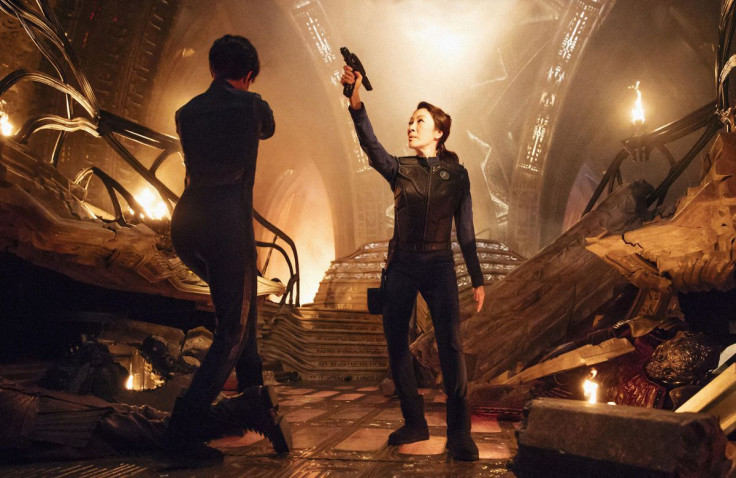In retrospect, concerns about Star Trek: Discovery’s fidelity to its source material feel a little silly. The series premiere opens with Klingon dialogue, Vulcans still do that tedious over-calculating thing and the Prime Directive gets its nod. Aside from major aesthetic alterations, Discovery is doctrinaire Star Trek. The flaws in Star Trek: Discovery don’t stem from an ignorance of Star Trek or its underlying humanist and liberal, open society precepts, but from plain old storytelling deficiencies.
Star Trek: Discovery, like the four Star Trek series before it, debuts with a narrative two-parter. And like so many Trek two-parters (TNG’s Season 5 “Unification” comes to mind), “The Vulcan Hello” and “Battle at the Binary Stars” delivers too little plot in too much time, holding viewers’ hands through pseudo-action sequences, desolate flashbacks and over-discussed decisions.
Star Trek: Discovery opens as the fanatical T’Kuvma (Chris Obi) addresses his followers. Though the divided Klingon Empire faces no direct military threat from the United Federation of Planets, T’Kuvma understands the threat posed by their philosophy of inclusion. The combined power of the Humans, Vulcans, Tellarites and Andorians (the Federation’s four founding species) not only aggregate their strength, but make an implicit argument for a worldview counter to the Klingon honor culture. T’Kuvma sees a stark choice ahead: accept the subordination of their culture under a unified order, or fight. “Lock arms against those whose fatal greeting is ‘we come in peace,’” T’Kuvma says before provoking a war with the Federation, forcing the Klingon leaders to join him in his crusade against the future.
T’Kuvma is both a religious maniac and a racist — “They wish to drag us into the muck where Humans, Vulcans, Tellarites and filthy Andorians mix” — but his Klingon chauvinism feels authentic and internally consistent. Like the elites of all societies, the great Klingon leaders abide by the cultural values they espouse only to the degree that it maintains their status and comfort, so it’s hard not to side with T’Kuvma when he berates the leaders of the Klingon Great Houses for their hypocrisy. This gives both T’Kuvma’s cultish followers and the larger Klingon society a pleasing verisimilitude.
Combined with a genuinely alien new look, great costuming and ornate production design, the Klingons are the best argument Star Trek: Discovery makes for watching past the premiere. It helps that the choice to tell the Klingon side in their native language necessarily limits and simplifies the dialogue.
Starfleet is neither as concise or well-drawn. Where the Klingon aesthetic reinvention distinguishes them from the goofier, barroom bards of The Next Generation, Starfleet’s look feels more about keeping up with sci-fi TV than speaking for itself. DSC looks slick and expensive, a natural outgrowth of shows like The Expanse and Battlestar Galactica. This is not a problem in itself — network TV will always reflect mass culture more than any vanguard — but it does put the onus on DSC’s writing to offer us something beyond the temporary novelty of new nacelles and new faces.
“Battle at the Binary Stars” doesn’t end well for Captain Philippa Georgiou (Michelle Yeoh) or the USS Shenzhou, so it’s not yet clear who will move to active duty aboard the Discovery in subsequent episodes. The Star Trek ensemble essential to previous entries has not yet cohered enough to make any judgments — Discovery’s Captain Gabriel Lorca (Jason Isaacs) hasn’t even appeared yet. Still, we’ve met at least two characters who will stick around for the duration.
First Officer Michael Burnham (Sonequa Martin-Green), DSC’s main character, is a child of two worlds, a human raised by Vulcans after Klingons killed her parents. It’s an overly familiar Star Trek dilemma, faced previously by both Spock and Worf, but Martin-Green mostly sells it. Her character combines the assertive fact fetish we’ve come to expect from Vulcans with a simmering human anger.
In classic Star Trek episodes, Sarek or Spock’s Vulcan logic can feel more like a passive-aggressive veneer, designed to assert logical correctness while covering underlying emotional reasoning. Discovery takes this ambiguity further, as Burnham insists her conclusions are unavoidable, even as everything points to her underlying personal motives.
Burnham’s right hand is Science Officer Saru, an exceptionally well-designed new alien species (Doug Jones’ remarkable body, animating monsters in movies like Pan’s Labyrinth, certainly helps), combining the scientific shrewdness of Spock with a pleasingly underplayed and nonjudgmental cowardice. So far, their relationship is the most well-drawn on the show (T’Kuvma and his zealous, lower-caste protege Voq come second), as their compatible working relationship butts heads with their constitutional differences.
Though there are a number of superficial resemblances to the rebooted Star Trek movie series, right down to characters warping into the Klingon capital ship (a beautiful creation, bristling all over with the coffins of fallen warriors) for a climactic phaser fight, Star Trek: Discovery takes its thematic concerns seriously. Where Krull’s motives in Star Trek Beyond were a lazy gloss atop a solid action-adventure, Discovery is foremost about a clash of civilizations between Klingon tribalism and Federation plurality.
Small touches throughout indicate Discovery’s desire to embrace true science fiction storytelling. Where Trek “logic” has always been shorthand for a calculating demeanor combined with the inability to factor in emotional motives, Discovery tries to take the Vulcans at their word. This leads to a few fascinating new insights into the Vulcan mentality, such as the first-strike policy Burnham describes when the Vulcans first started running into Klingons, mirroring game theory policies like economist Robert Aumann’s repulsive proposal to program Israeli missile batteries to retaliate automatically to rockets from the Gaza Strip. In “Battle at the Binary Stars,” Burnham argues against the ethical parameters of the ship’s computer, a short scene that evokes serious questions about human-machine interfaces in our increasingly computer-dependent future.
If only Discovery trusted its viewers to suss out complexities for themselves. There’s a ploddingly literal quality to the first two episodes, which never let an ambiguous line pass without three further bits of dialogue teasing out the themes. Rather than actually living the utopian lessons of the Star Trek future, too many members of Starfleet seem to prefer explaining their foundational assumptions. Burnham and Georgiou interrupt tense standoffs with the Klingon empire to fight over values, eschewing the specific for the thematic and ripping out subtext like copper wiring. “Good,” a Starfleet officer says when T’Kuvma accepts a ceasefire, “because if we’re fighting, we’re not talking.” Thanks, Admiral Guidance Counselor.
Star Trek: Discovery’s show-don’t-tell problem is most dramatic in the tepid flashbacks littered throughout. Flashbacks to T’Kuvma and Michael Burnham’s childhoods stretch crumbs of plot into tedious vignettes. Knowing T’Kuvma was bullied as a kid doesn’t add anything to his character. The moment is made even more baffling by its framing, as T’Kuvma dumps his childhood hangups on the leaders of the Great Houses right when he’s first grabbed their attention. Get to the big plans and save it for your diary, Kuv!
The problems and promise of Star Trek: Discovery are all captured in its opening credits. The theme begins and ends on musical motifs ripped from the original series, but otherwise feels like on-brand noodling. Motion graphics of various pieces of Star Trek technology swirling about in a symbolic, conjectural void aligns Discovery with any other prestige genre show, most obviously Westworld. Spaceships and communicators emerge from null space — lines and numbers conspiring to build a real object. It’s a loving enshrinement more than an adventure into the unknown. We’re left with an impression of craftsmanship, from dedicated and Trek-literate designers, but with the focus on the act of creation itself, rather than the unexpected outcomes that result.
- Richly redesigned Klingons
- Complex and explicable motives
- Great new Starfleet characters
- Incredible production design
- Generic space combat and action
- Too many flashbacks
- Eschews subtext, doesn't put enough faith in the audience



















